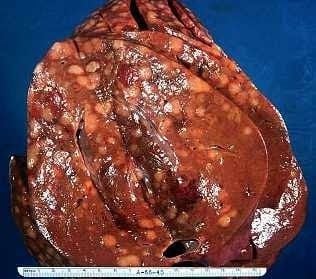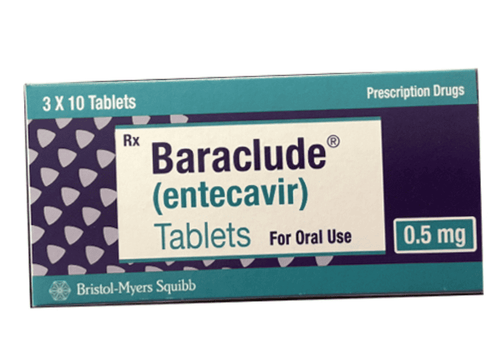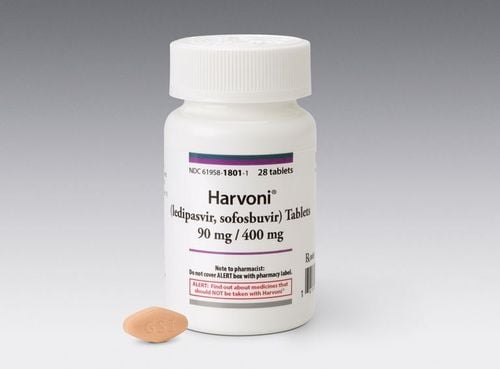This is an automatically translated article.
Hepatocellular carcinoma (HCC) is a malignant disease, with a high degree of danger. In the early stages, treatment of hepatocellular carcinoma by liver resection is indicated by many doctors for patients.
1. An overview of hepatocellular carcinoma (HCC)
Hepatocellular carcinoma is a highly common cancer. It is the disease with the highest rate of new cases and deaths in both men and women. The disease occurs when liver cells become morphologically and functionally abnormal, clump together into a malignant tumor, capable of spreading to many organs in the body.
The exact cause of liver cancer is still unknown. However, some people have a higher rate of infection if: Hepatitis B, C virus infection; cirrhosis, heavy alcohol consumption, aflatoxin poisoning, Wilson's disease,...
Early-stage hepatocellular carcinoma often has no symptoms and is difficult to detect. At the late stage, the patient may have symptoms such as feeling of heaviness, pain, palpable right lower quadrant tumor, loss of appetite, fatigue, weight loss, abdominal distention, jaundice, yellow eyes, dark urine, pale stools,... When there is distant metastasis, the patient may have symptoms in the organ where the cancer has spread: Brain, lung, bone,...

Hình ảnh ung thư biểu mô tế bào gan (hcc)
2. Liver resection in the treatment of hepatocellular carcinoma
2.1 Treatment methods for liver cancer The choice of treatment method for the disease is decided by criteria such as: The stage of the disease and the general health of the patient. Treatment methods include: liver resection, liver transplant surgery, embolization, radiation therapy (internal radiation therapy, external radiation therapy), local radical treatment (microwave solidification of the tumor, alcohol injection through skin, radiofrequency ablation,...), targeted therapy, chemotherapy, immunotherapy,...
In the early stages, methods such as liver resection, liver transplantation and radiofrequency ablation are often selected to improve patient survival. In the middle stage, patients are often treated with chemotherapy for embolism. In the advanced stage, the patient was treated with Sorafenib. Towards the end, treatment is mainly palliative care.
2.2 Learn about liver resection Liver resection is the treatment of choice for patients with early-stage hepatocellular carcinoma, who have not yet developed cirrhosis. In patients with cirrhosis, hepatectomy is indicated in cases where liver function is preserved, the nodule is isolated, and there is no portal hypertension.
The 5-year survival rate is about 50-75% in hepatectomy patients, but the recurrence rate (tumor growth and metastasis) can be as high as 50%. Therefore, hepatectomy is not recommended for hepatocellular carcinoma with vascular invasion or metastatic tumor.
3. Some questions about hepatectomy for hepatocellular carcinoma
3.1 The process of performing the surgery Surgery is performed under general anaesthesia, the time lasts about 3 - 6 hours or longer. Most liver resections are open surgery through an incision in the skin in the abdomen (laparotomy). Occasionally, a doctor can perform a less invasive laparoscopic liver resection. The choice of surgery depends on the size and number of tumors to be removed. Laparoscopic surgery will help patients more comfortable, less pain after surgery and shorter hospital stay.
After the surgery is over, the patient is taken to the recovery room. Upon awakening, the patient is transferred to the intensive care unit for 1-2 days or until the patient is healthy enough to return to the ward. In the intensive care unit, the patient is fitted with a machine to monitor heart rate, blood pressure, and fluid volume.
3.2 Some risks after liver resection Complications when performing liver resection surgery include:
Lung infection: Due to the incision in the abdomen, the patient may find it difficult to take a deep breath or cough, leading to lung infection. The physiotherapist will teach the patient breathing exercises to prevent lung infections. Patients are also encouraged to get up and walk as soon as possible. The risk of respiratory complications increases if the patient is overweight or smokes; Surgical site infection: Despite prophylactic antibiotic therapy (using antibiotics several hours before surgery, for up to 24 hours), the incision remains at risk of infection. Medical staff will regularly check for signs of infection, keeping the patient's wound clean and dry. If you have an infection, you may need antibiotics; Blood clots in the legs and pulmonary embolism: Post-hepatectomy patients are advised to walk as soon as possible. The patient will be provided with a special type of surgical socks to take to the hospital, combined with blood thinner injections and leg exercises according to instructions to prevent blood clots; Bleeding during or after surgery: Blood transfusions or re-surgery may be needed. In most cases, the condition does not require intervention and is resolved; Bile leak from the liver section: accounts for 5 - 10% of cases. This condition is usually self-limiting and is treated with bile drainage. Sometimes doctors need to perform laparoscopic surgery to decompress the biliary tree; Liver failure: This complication can occur if the remaining liver is not enough to support normal functions. This is common in patients with chronic hepatitis. Liver failure can lead to leg edema, jaundice, lethargy,... When this happens, the patient will be given drugs to support the liver until the liver recovers; Mortality: The 30-day mortality rate after surgery is less than 1% (due to serious complications or some other problem).

Sau phẫu thuật cắt gan người bệnh có thể gặp một số nguy cơ
3.3 Length of hospital stay and recovery Most patients can be discharged 8 days after liver resection. The length of hospital stay depends on the patient's speed of recovery after surgery, general health, and complications. After being able to eat, drink and walk on their own, and be confirmed by the surgeon that the process is progressing and recovering well, the patient can be discharged from the hospital.
It will take some time for the patient to recover to his pre-surgery health. This process can take anywhere from a few weeks to several months. Patients should pay attention to rest as much as possible and gradually increase the level of activity. In addition, patients should exercise gently every day, do not overdo it. Exercises such as walking, swimming, ... will help patients recover.
Patients should avoid heavy lifting, driving for 6 weeks after surgery. Patients should also avoid alcohol for at least 3 months after liver resection. This is the time when the liver is rebuilding. In the future, the patient should also not drink alcohol, follow up with the doctor's appointment.
4. Prevention of the risk of hepatocellular carcinoma
Hepatocellular carcinoma is a common disease in Vietnam. Each person can reduce the risk of disease if they actively prevent it by:
Vaccination, avoiding infection with hepatitis B and C viruses; limit drinking alcohol, avoid moldy foods containing aflatoxin; Treat hepatitis B, C from acute form, not let the disease progress to chronic to avoid the risk of cirrhosis; Patients with chronic liver damage and cirrhosis should undergo abdominal ultrasound and periodic AFP quantification to promptly detect the disease. Hepatectomy for hepatocellular carcinoma (HCC) is performed to remove tumors in the liver. When choosing this treatment method, patients need to absolutely follow the doctor's instructions to improve their chances of survival and improve their quality of life.
Vinmec International General Hospital is one of the hospitals that not only ensures professional quality with a team of leading medical professionals, modern equipment and technology, but also stands out for its examination and consultation services. comprehensive and professional medical consultation and treatment; civilized, polite, safe and sterile medical examination and treatment space.
Please dial HOTLINE for more information or register for an appointment HERE. Download MyVinmec app to make appointments faster and to manage your bookings easily.













